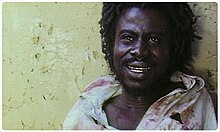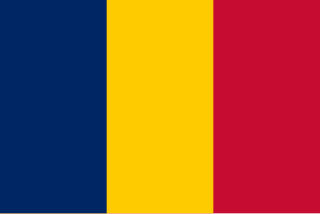
Chad, officially the Republic of Chad, is a landlocked country at the crossroads of North and Central Africa. It is bordered by Libya to the north, Sudan to the east, the Central African Republic to the south, Cameroon to the southwest, Nigeria to the southwest, and Niger to the west. Chad has a population of 16 million, of which 1.6 million live in the capital and largest city of N'Djamena.

Cinema of Africa covers both the history and present of the making or screening of films on the African continent, and also refers to the persons involved in this form of audiovisual culture. It dates back to the early 20th century, when film reels were the primary cinematic technology in use. During the colonial era, African life was shown only by the work of white, colonial, Western filmmakers, who depicted Africans in a negative fashion, as exotic "others". As there are more than 50 countries with audiovisual traditions, there is no one single 'African cinema'. Both historically and culturally, there are major regional differences between North African and sub-Saharan cinemas, and between the cinemas of different countries.
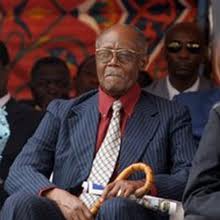
Félix Malloum or Félix Malloum Ngakoutou Bey-Ndi was a Chadian military officer and politician who served as the second President of Chad from 1975 to 1978.
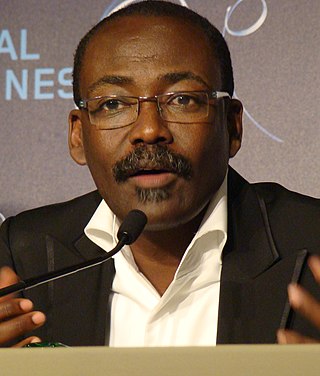
The Cinema of Chad is small though growing. The first film made in the country appears to have been 1958 John Huston adventure film The Roots of Heaven, filmed when the country was still a part of French Equatorial Africa. Documentary filmmaker Edouard Sailly made a series of shorts in the 1960s depicting daily life in the country. During this period there were a number of cinemas in the country, including in N'Djamena Le Normandie, Le Vogue, the Rio, the Étoile and the Shéherazade, and also the Rex in Sarh, the Logone in Moundou and the Ciné Chachati in Abéché. The film industry suffered severely in the 1970s-80s as Chad became engulfed in a series of civil wars and foreign military interventions; film production stopped, and all the cinemas in Chad closed down. Following the ousting of dictator Hissène Habré by Idriss Déby in 1990 the situation in the country stabilised somewhat, allowing the development of a nascent film industry, most notably with the work of directors Mahamat-Saleh Haroun, Issa Serge Coelo and Abakar Chene Massar. Mahamat-Saleh Haroun has won awards at the Panafrican Film and Television Festival of Ouagadougou, Venice International Film Festival and the Cannes Film Festival. In January 2011 Le Normandie in N'Djamena, said to now be the only cinema in Chad, re-opened with government support.

Bye Bye Africa is a 1999 award-winning Chadian film. It was the first by Chadian director Mahamat Saleh Haroun, who also starred. The docu-drama centers on a fictionalized version of Haroun.
Issa Serge Coelo is a Chadian film director. Born in Biltine, Chad, he studied history in Paris and film at the École supérieure de réalisation audiovisuelle (ÉSRA). He then worked as a cameraman at Métropole Télévision, France 3, TV5MONDE and CFI before creating the 1994 short film Un taxi pour Aouzou. The film was well-received, being nominated for a 1997 César Award in the category Best Short Film - Fiction. This was followed by the feature films Daresalam (2000) and Tartina City (2006). He also portrayed himself in the 1999 film Bye Bye Africa, which was directed by Chad's other prominent director Mahamat Saleh Haroun.
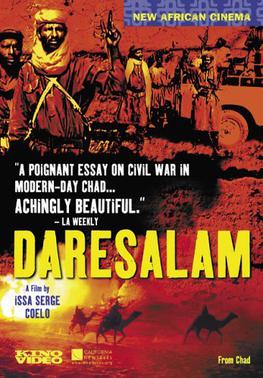
Daresalam is a 2000 dramatic film by Chadian director Issa Serge Coelo. It has been considered one of the very few recent African films that has treated the theme of the internecine conflicts that have ravaged the African continent since independence. While set in a fictional African country called Daresalam, it reflects the civil war that ravaged Chad during the 1960s and 1970s.
Youssouf Djaoro is a Chadian film actor.
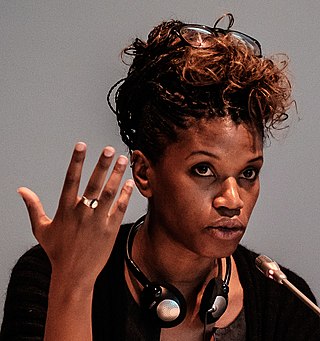
Rama Thiaw is a Senegalese filmmaker and screenwriter. She is known for her 2009 documentary Boul Fallé, la Voie de la lutte and her most recent documentary The Revolution Won’t be Televised (2016).
Lula Ali Ismaïl is a Djibouti-Canadian film director and screenwriter. She is the first woman from Djibouti to produce a film, earning her the nickname of "the first lady of the Djibouti cinema." The directed the 27-minute fiction short Laan (2011). The film was screened at the 2012 Montreal Vues d'Afrique festival, and in 2013 at FESPACO. In 2014 she started working on a feature film, Dhalinyaro, co-written with Alexandra Ramniceanu and Marc Wels. The film, Djibouti's first feature film, premiered in July 2017.
Olivier Barlet is a French journalist, translator, film critic and researcher on African cinema and its diasporas.

Aché Coelo is a Chadian sociologist and film director.

Nadia Kounda is a Moroccan film actress.
Alioune Ifra Ndiaye is a Malian film director and playwright.

The Transitional Military Council was a military junta that ruled Chad from 2021 to 2022. It announced the death of former President Idriss Déby on 20 April 2021, and declared that it would take charge of the government of Chad and continue hostilities against FACT rebels in the north of the country. It was chaired by Mahamat Idriss Déby, the son of the late President, making him the de facto President of Chad. It was dissolved on 10 October 2022, following a "national dialogue" that named Déby Transitional President and replaced the CMT with a transitional administration appointed by him.
Un taxi pour Aouzou, is a 1994 Chadian short drama film directed by Issa Serge Coelo and produced by Dominique Andreani for Movimento Production. The film stars Abdoulaye Ahmat and Ali Baba Nour. The film revolves around Abdoulaye Ahmat, a Libyan woman falls in love with Ali Baba Nour, a Chadian man at the time of the Libyan-Chadian conflict.
Bouzié, is a 1996 Franco-Ivorian short film directed by Jacques Trabi and produced by Issa Serge Coelo for Parenthese Films. The film stars Thérèse Sialou, Serge Touvolly, Michel Ibo, and Madeleine Kouassy. The film deals with Zébia, an African working in France, buys a plane ticket to Paris to his mother Bouzié to bring her to France and give her a comfortable life.
Ismael El Maoula El Iraki is a French-Moroccan filmmaker. He is a survivor of the November 2015 attacks on the Bataclan in Paris, which inspired his first feature film, Zanka Contact.

Borders is a 2017 drama film co-produced between Burkina Faso and France, directed and written by Apolline Traoré and starring Amelie Mbaye, Naky Sy Savané, Adizelou Sidi, and Unwana Udobeong in the lead roles.
